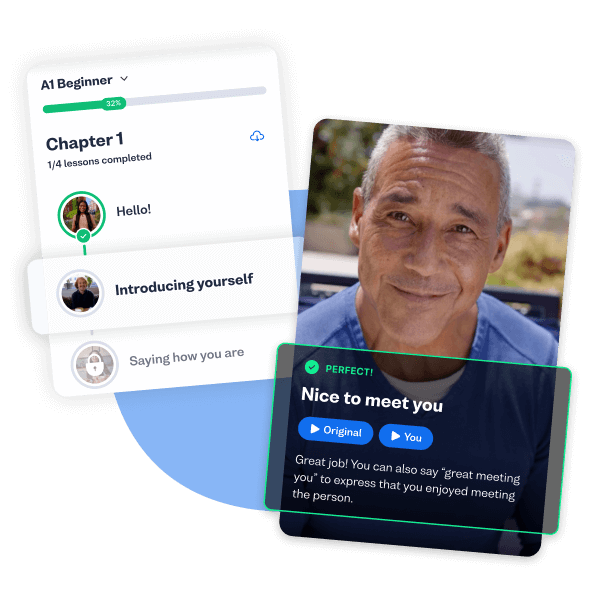I want to learn...
Learning a second language has an array of benefits. It is an absorbing hobby, a healthy pastime, an exercise for your brain, a key to exploring other cultures and understanding yourself. Moreover, it is a valuable tool for navigating a multilingual world and can generate many prospects for people from all walks of life.
If you are seeking a job, learning a second language can put you ahead of your competitors as you will have more ways to communicate and more people to share with. And if you are a student aiming to add to your life prospects by moving abroad, learning a second language can contribute to ease of communication with fellow students from different nationalities and connecting with other cultures.
Here’s a top-10 list of second language learning benefits:
1. Improves cognitive sharpness
Research shows that learning a new language has many cognitive benefits and helps one become smarter. A brain store of two languages is better at resolving internal conflicts, decision-making, and multitasking. This is because a bilingual brain navigates through the vocabulary, grammar, and syntactic structure of two languages.
Students who study a second language have also been found to improve in other subjects. They can transfer their problem-solving skills to other areas of academic endeavor and easily outperform their peers.
2. It makes you happy
Studies show that language acquisition has been shown to breed positive attitudes for language learners towards the local culture or nationality that speaks the second language natively. In addition, involvement with the local culture through second language learning and speaking creates a positive socio-cultural attitude and motivates the learner to learn more, according to a study done by Mishan in 2005.
Imagine traveling to another country and talking to people who can give you a real insight into their culture. If you know how to speak the local language, you can easily ask for restaurant recommendations, make new friends, attend a local cinema, and listen to local music. It makes life easier and more enjoyable for you!
3. Brings more social opportunities
The skill of speaking a second language always brings more opportunities for socialization for its speakers. With a potentially larger pool of people to connect with and heightened self-confidence comes more job opportunities, a broader understanding of other cultures, opportunities for world travel, and a chance to study abroad.
By speaking a second language, you can make new friends, extend your network, form new business partnerships, find new study buddies, and make your communication smoother than ever.
4. Better career prospects
In today's globalized world, where the movement of people and business has become common, learning a second language has become an essential skill for personal and professional development. In addition, it has become an important aspect of reskilling yourself for an ever-expanding job market. Translation, interpretation, editing, dubbing, voice-overs, tourism, hospitality management, social service, and international business are some of the welcome avenues for speakers of a second language.
By being able to smoothly communicate through a second language, you can secure a job in the most sought-after destinations in the world, sell your skills to prospective employers, and gain a competitive advantage in the international job market.
Think of the reverse too! Not knowing a second language can limit your chances of professional growth, even when you are at the top of your field.
Want to learn a second language?
Busuu offers French and 13 other languages to choose from, with courses that can help you learn a second language in no time and start using it to integrate (“s’intégrer” in French) in a new country or company for your work. Start learning and speak a new language today!
5. It brings intercultural connection and self-discovery
Learning a language is a great way to connect virtually and physically with other cultures. For instance, if you are traveling to one of your favorite destinations, you can have better guidance, more ways to understand the culture, and more meaningful connections if you can speak the local language in the country you are traveling in. The mutual dependability of culture and language is inevitable and leads to the conclusion that language is the gateway to culture.
One of the key benefits of learning a second language is also improving self-recognition. This point is linked with cultural exposure: learning about others is learning about yourself. Other people can be the best guide to what or what not you want to become. The more you know about others, the more you know about yourself. In the same vein, the more you know about other cultures, the more knowledgeable you become about your own.
6. It strengthens your decision-making ability
Learning a second language can improve your ability to make better decisions because studies have shown that bilingual speakers are better at analyzing and processing information leading to effective and rational decision-making.
This is because when you know two languages, you can think more critically and analytically, making you explore a problem from multiple angles and dimensions.
If you are a doctor or a medical professional for example, learning a second language can improve your analytical and decision-making skills that can be beneficial in making informed decisions and recommending appropriate treatment and medicine for patients from diverse backgrounds.
7. It broadens your perspective
Learning a new language adds another lens to your sight, broadens your perspective, and allows you to view the world from multiple angles.
Marty Rubin rightly said, "When you learn a new language, you learn a new way of seeing the world."
For example, in English, ' he' and 'she’ is used for male and female genders, while in Chinese, the word ‘tā" (他)’ is used for both genders. For someone coming from an English-speaking background and learning Chinese as a second language, this way of signifying gender is a new perspective.
8. It can boost your confidence
Learning a language can boost your confidence in many ways. First, it allows you to feel more at ease while conversing with others. Second, it gives you a sense of accomplishment, which adds to your confidence.
Suppose you are a native English speaker attending a conference at work with French delegates. You have been learning French for the last few weeks using Busuu's French course. As you start talking in French, you surprise the French delegates and your colleagues. This not only boosts your confidence, but it also motivates you to learn more and improve your progress.
9. Contributes to better communication skills
Learning a second language improves your communication skills in several ways. It gives you new words, more comprehensive expressions, and background knowledge of culture. Moreover, it is common to observe that various languages have words for expressions that cannot be entirely captured in translations. Therefore, quoting directly from that language is always more comprehensive and enjoyable.
10. It creates a healthy pastime for you
Learning a second language is not only beneficial for your career or travel plans, but also leads to the development of a healthy pastime that contributes to your well-being. If you set achievable goals for yourself, you can see your progress and measure your commitment.
Busuu provides a platform where you can learn a language at your pace and connect and practice with people worldwide. In this connected community of second language learners worldwide, you can find potential employers, colleagues, friends, local hosts, tour guides, and what not.
AUTHOR

Barney Meekin
Newlanguages


